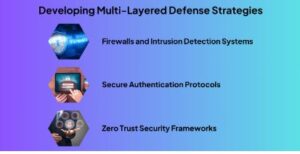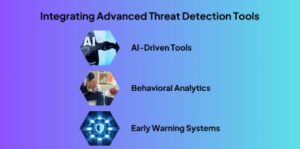How IT Security Consultants Help Minimize Business Cyber Risks

In an environment where cyber threats evolve continuously, organizations face the pressure of staying one step ahead in the competition for the sake of the safety of data and systems and their reputation. The stakes are very high because a cyber incident in an organization can mean stopped operations, damaged reputation, and alarming financial setbacks.
It is here that IT security consultants – well-practiced individuals who know all the ins and outs of digital defenses and how best to fit them in to suit the different needs of each business – come into play.
These experts come up with a robust approach to cybersecurity consulting based on help for businesses, thus allowing companies to run cyber-attacks head-on in terms of constructing defenses that will keep businesses secure and ready for whatever the unexpected might bring.
Comprehensive Risk Assessment and Vulnerability Analysis
An IT security consultant begins by understanding where your business might be vulnerable, uncovering weak points, and developing a tailored approach to safeguard your operations.
Identifying Weak Points
IT security consultants thoroughly assess your networks, systems, and workflows, identifying gaps or weaknesses that cybercriminals could exploit. They often conduct penetration testing and simulated attacks to uncover vulnerabilities that may not be visible on the surface.
Evaluating Business-Specific Risks
Cyber risks vary across industries, so IT security consultants factor in industry-specific threats and compliance requirements. For example, a healthcare provider will have different data security needs compared to a financial institution. This tailored approach ensures that every potential risk is covered according to your business’s unique environment.
Building a Risk Profile
Both internal and external dangers are described in depth in a thorough risk profile. An IT security consultant uses this profile to prioritize risks based on potential impact, helping you make informed security investments.
Implementing Proactive Cybersecurity Measures
Proactive cybersecurity measures are crucial, and that’s where a cyber security consultant comes in. These professionals help businesses build defenses that don’t just respond to attacks but actually prevent them from happening. Let’s examine their method.
1. Developing Multi-Layered Defense Strategies
Cybersecurity is strongest when it’s layered. A cyber security consultant designs these layers, ensuring that if one defense fails, there’s always another ready to step in.

- Firewalls and Intrusion Detection Systems: Consultants install firewalls as a first line of defense to filter out the bad guys ahead of reaching your network, and intrusion detection systems monitor the networks themselves and warn the team of any suspicious activity in the same.
- Secure Authentication Protocols: Consultants support the installation of secure multi-factor authentication, which verifies users before allowing them access to sensitive information. This gives an added layer of security that isn’t easily accessed even though the person may have had a password somehow.
- Zero Trust Security Frameworks: consultants often recommend such an approach as zero trust, assuming absolutely that the internal user or system is not trustworthy. This will ensure that every attempt at access will be verified, and therefore limit the risk of internal threats or compromised devices.
2. Regular Updates and Patching Protocols
Outdated software and systems are a goldmine for cyber attackers, who often exploit known vulnerabilities to gain access. IT security consultants keep systems current and reduce these risks.

- Automated Patch Management: Consultants set up automated patching for critical systems, ensuring they’re always up to date without manual intervention. This is key for staying ahead of potential exploits and reducing human error in updates.
- Update Testing and Scheduling: For systems where updates might impact functionality, consultants test patches before deploying them. They also create a schedule for regular updates, minimizing disruptions to business operations while keeping security tight.
- Vulnerability Scanning for Unpatched Systems: Beyond just applying patches, consultants use vulnerability scanning tools to identify any areas that may need additional attention, closing any gaps that attackers might use.
3. Integrating Advanced Threat Detection Tools
When it comes to cybersecurity, quick detection is key. The faster a threat is identified, the sooner it can be neutralized. Cyber security consultants use cutting-edge technology to keep watch over networks and detect any unusual activity.

- AI-Driven Tools: Many cyber security consultants deploy artificial intelligence tools that learn from patterns in data to detect potential threats faster. This proactive approach enables systems to pick up on unusual activity in real-time, even if it’s something the security team hasn’t encountered before.
- Behavioral Analytics: Consultants often use behavioral analytics to monitor for unusual user actions or access attempts. This technology helps flag actions that may indicate a breach, such as repeated failed login attempts or access requests from unexpected locations.
- Early Warning Systems: By setting up alerts and early warning mechanisms, consultants can inform security teams as soon as a threat is detected. These real-time notifications allow businesses to act quickly and minimize damage.
Employee Training and Cybersecurity Awareness
A cyber security consultant plays a vital role in building a workforce that’s alert, informed, and ready to tackle security risks head-on. Here’s how they help cultivate a security-conscious culture:
Building a Security-Conscious Culture
Consultants educate employees on key practices like password management, recognizing phishing attempts, and secure data handling, making security a part of everyday work.
Customized Training Programs
They design training that fits the unique needs of the organization, addressing specific threats relevant to the industry and equipping employees with practical knowledge.
Simulating Cyber Attacks for Real-World Readiness
Through phishing simulations and response exercises, consultants give employees hands-on experience in spotting and responding to threats, ensuring the team is prepared for real incidents.
Developing Incident Response and Recovery Plans
With proactive cyber security consulting, businesses are building resilience to bounce back stronger.
Preparing for Quick and Effective Response
Consultants develop a clear incident response framework, outlining who does what to detect, contain, and neutralize threats quickly.
Creating a Disaster Recovery Roadmap
They design recovery plans to restore data fast, so business operations can get back on track with minimal loss and disruption.
Conducting Regular Drills
Routine drills give IT teams and employees practical experience in handling breaches, building confidence and readiness for real incidents.
Ensuring Regulatory Compliance and Data Privacy
With the support of an information security consultant, businesses build a culture of data privacy that protects both the company and its customers.
Navigating Complex Compliance Requirements
Information security consultants ensure that companies meet key standards like GDPR, HIPAA, and CCPA, reducing the risk of costly penalties.
Establishing Data Protection Protocols
They set up strong policies for how data is collected, stored, and shared, ensuring that privacy laws are respected every step of the way.
Providing Ongoing Compliance Monitoring
With continuous monitoring, consultants keep businesses up-to-date as laws and regulations evolve, ensuring compliance remains strong over time.
Frequently Asked Questions (FAQs)
- How do IT security consultants stay updated on emerging threats?
IT security consultants stay current by monitoring global cyber trends, attending industry conferences, and collaborating with cybersecurity organizations to leverage the latest protection techniques.
- What should my company look for when hiring an IT security consultant?
Look for consultants with a proven track record, certifications like CISSP, CISM, or CEH, industry-specific experience, and the ability to tailor solutions to your business needs.
- Can a small business afford IT security consulting services?
Yes, many consultants offer scalable options that fit various budgets, helping small businesses save by preventing costly cyber incidents.
Final Thought
IT security consultants are what any business entity, embedded in high-stake digital world-building, needs to remain resilient, and cybersecurity consulting will help build a proactive culture ready to face these threats head-on. IT security consultants bring forth the tools, strategies, and know-how to safeguard data and inspire trust and reliability with clients and partners. Partnering with a seasoned consultant allows these businesses to concentrate on growth while knowing that their digital assets remain safe and ready for the next cyber challenge.
